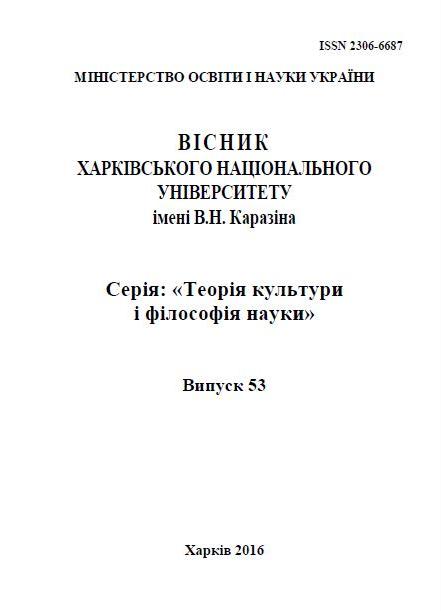Formation and development of methodology and philosophy of education
Keywords:
science, education, training, methodology of education, philosophy of education.
Abstract
In the article the features of formation and development of the methodology and philosophy of education Done historical and philosophical analysis of the origin of the philosophy of education. Since Socrates, philosophy questioned the «obvious» critically rethink existing algorithms thinking , constantly expanding its scope and range of products. Thus, it is the philosophy of the perceived crisis of education formed new ideals of education, new ideas about the process of learning and education and so on. Today, the substance of the problem is trying to understand the philosophy of education. Аnalyzed the formation of new ideals of education, new ideas about the process of learning and education. We characterize modern philosophies of education methodology and basic principles of the existence of modern education.The attention to new philosophical concepts of education. Characteristic of modern concepts of education philosophy is the focus on criticism of the classical type of education, which started the «new philosophers of science»–Т. Kuhn, I. Lakatos, P. Feyerabend. Modern philosophies demonstrate full methodology dominant orientation and basic principles of the existence of modern education: humanistic principle, the principle of differentiation and the principle of integration, based on these principles can be a concept of education that would be the epitome of modern achievements in philosophy of education.
Downloads
Download data is not yet available.
References
Беспалько В. П. Образование и обучение с участием компьютеров: (педагогика третьего тысячелетия) / В. П. Беспалько; РАН; Моск. Психолого-соц. ин-т. – М.: Моск. Психолого-соц. ин-т; Воронеж: НПО МОДЭК, 2002. – 349 с.
Вандышев В. Н. Философский анализ дифференциации естественнонаучного познания: монография / В. Н. Вандышев. – К.: Выща школа. Головное издательство, 1989. – 175 с.
Гітун Н. І. Філософія освіти: аналіз культуротворчої парадигми в освіті /Н.І.Гітун //Проблеми педагогічних технологій. – 2010. – № 2. – С. 70–77.
Зязюн І. А. Гуманізм освіти ХХІ століття: філософський і психологічний аспект // Теорія і практика управління соціальними системами. – Харків: НТУ “ХПІ”. – 2002. – № 2. – С. 24-35.
Крижко В. В. Антологія аксіологічної парадигми освіти. Навч. посібник / Крижко В. В., Мамаєва І. О. – К.: Освіта України, 2005. – С. 61.
Огнев’юк В. О. Освіта міжпарадигмального періоду / В. Огневюк. – Нова парадигма. – 2006. – № 50. – С. 36-48.
Романенко М. І. Сучасна філософія освіти : основні проблеми // Гуманітарний вісник Запорізької державної інженерної академії. – Вип. 8. – Запоріжжя: ЗДІА, 2002.
Сичивица О. М. Сложные формы интеграции науки: монография / О. М. Сичивица. – М.: Высшая шк., 1983. – 152 с.
Фомичева И. Г. Философия образования: Некоторые подходы к проблеме / И. Фомичева. – Новосибирск: Изд-во СО РАН, 2004. – 242 с.
Вандышев В. Н. Философский анализ дифференциации естественнонаучного познания: монография / В. Н. Вандышев. – К.: Выща школа. Головное издательство, 1989. – 175 с.
Гітун Н. І. Філософія освіти: аналіз культуротворчої парадигми в освіті /Н.І.Гітун //Проблеми педагогічних технологій. – 2010. – № 2. – С. 70–77.
Зязюн І. А. Гуманізм освіти ХХІ століття: філософський і психологічний аспект // Теорія і практика управління соціальними системами. – Харків: НТУ “ХПІ”. – 2002. – № 2. – С. 24-35.
Крижко В. В. Антологія аксіологічної парадигми освіти. Навч. посібник / Крижко В. В., Мамаєва І. О. – К.: Освіта України, 2005. – С. 61.
Огнев’юк В. О. Освіта міжпарадигмального періоду / В. Огневюк. – Нова парадигма. – 2006. – № 50. – С. 36-48.
Романенко М. І. Сучасна філософія освіти : основні проблеми // Гуманітарний вісник Запорізької державної інженерної академії. – Вип. 8. – Запоріжжя: ЗДІА, 2002.
Сичивица О. М. Сложные формы интеграции науки: монография / О. М. Сичивица. – М.: Высшая шк., 1983. – 152 с.
Фомичева И. Г. Философия образования: Некоторые подходы к проблеме / И. Фомичева. – Новосибирск: Изд-во СО РАН, 2004. – 242 с.
Cited
How to Cite
Лаута, О. Д. (1). Formation and development of methodology and philosophy of education. The Journal of V. N. Karazin Kharkiv National University. Series "Theory of Culture and Philosophy of Science", 117-120. Retrieved from https://periodicals.karazin.ua/thcphs/article/view/5864
Issue
Section
ФІЛОСОФСЬКІ ПРОБЛЕМИ НАУКИ І ОСВІТИ




